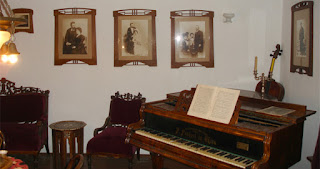Borisav Bora Stanković (born 31 March 1876 in Vranje, died 22 October 1927 in Belgrade) was a Serbian writer belonging to the school of realism. His novels and short stories depict the life of people from south Serbia. He belongs to an exceptional group of storytellers that suddenly appeared at the turn of the 20th century - Ivo Ćipiko, Petar Kočić, Milutin Uskoković and others. These Serbian prose writers showed many traits in commom with the Russians, particularly with Dostoyevsky (Bora Stanković) and to a certain extent also with Maxim Gorky (Ivo Čipiko and Petar Kočić).
Stanković completed the primary and secondary school in Vranje, and graduated from the University of Belgrade's Law School. It is said that he received some Western education - Paris - but returned unaffected to his native soil and subsequently immortalized it in his work. He worked as a clerk (first customs official then tax official) in Belgrade. During World War I he resided in Niš, then in Montenegro where he was taken captive by the Austrians. After the war he worked in the Department of Arts of the Ministry of Education. He died in Belgrade in 1927.
Borisav Stanković's best work is the 1910 novel entitled Impure Blood (Nečista krv) about the plight of a young woman unable to free herself from the old customs and restrictions. In this story he explored the contradictions of man's spiritual and sensory life. This was the first Serbian novel to receive praise in its foreign translations from international literary critics. At the turn of the 20th century folk musicals became popular and the best play of this genre is Stanković's Koštana, written in 1902. Its bittersweet story of a beautiful Gypsy girl and her amorous conquest of an entire provincial town is intertwined with quasi-philosophical musing about the meaning of life and the passing of youth. Stanković's other play, Tašana, written in 1910, is also about provincial life in southern Serbia, which had just been liberated from the Turks but was still living under the imprint of the centuries-long occupation. In practically all his works Stanković presents strong characters who are at the same time victims of a strange weakness stemming from the realization that their time has irrevocably passed.
It is said that he is the most important late Serbian realist, who interconnected poetic and narrative procedures in a complex manner and departed so significantly from realist canon that his prose is regarded as transitional. His other main works are: short story collections, Iz starog jevandjelja (From an Old Gospel, 1899), Stari dani (The Old Days, 1902), and Božji ljudi (God's People, 1902); and a play Tašana (1910).
House of Bora Stankovic is located in Vranje, in Grandma Zlata's street (baba Zlatina ulica) number 9, the former Donja mala, on the land that was bought by Bora's grandmother that gave the street its name. This object is significant because it is in this house where famous writer Borislav Stankovic was born. House of Bora Stanković has the status of cultural monument of great importance.
Today in this house is the Museum of Bora Stanković. The house was built in 1855 as a four-building with an open porch and oriel under which is the entrance to the basement. It was built in half-timbered, and the roof is covered with tiles. The yard is adorned garden with old mulberry tree. Guest room is the biggest room in the house, it is furnished semi-oriental, and right beside it is "Zlata's" room, with a bed and loom. "Libade" are hung on the walls of the room, along with aprons of Bora's mother Vaska. The house is now opened for visitors.
Today the house is in poor condition and is waiting for the city to devote resources in order to restore the currently dilapidated house and "Baba Zlata's room".

































.jpg)

